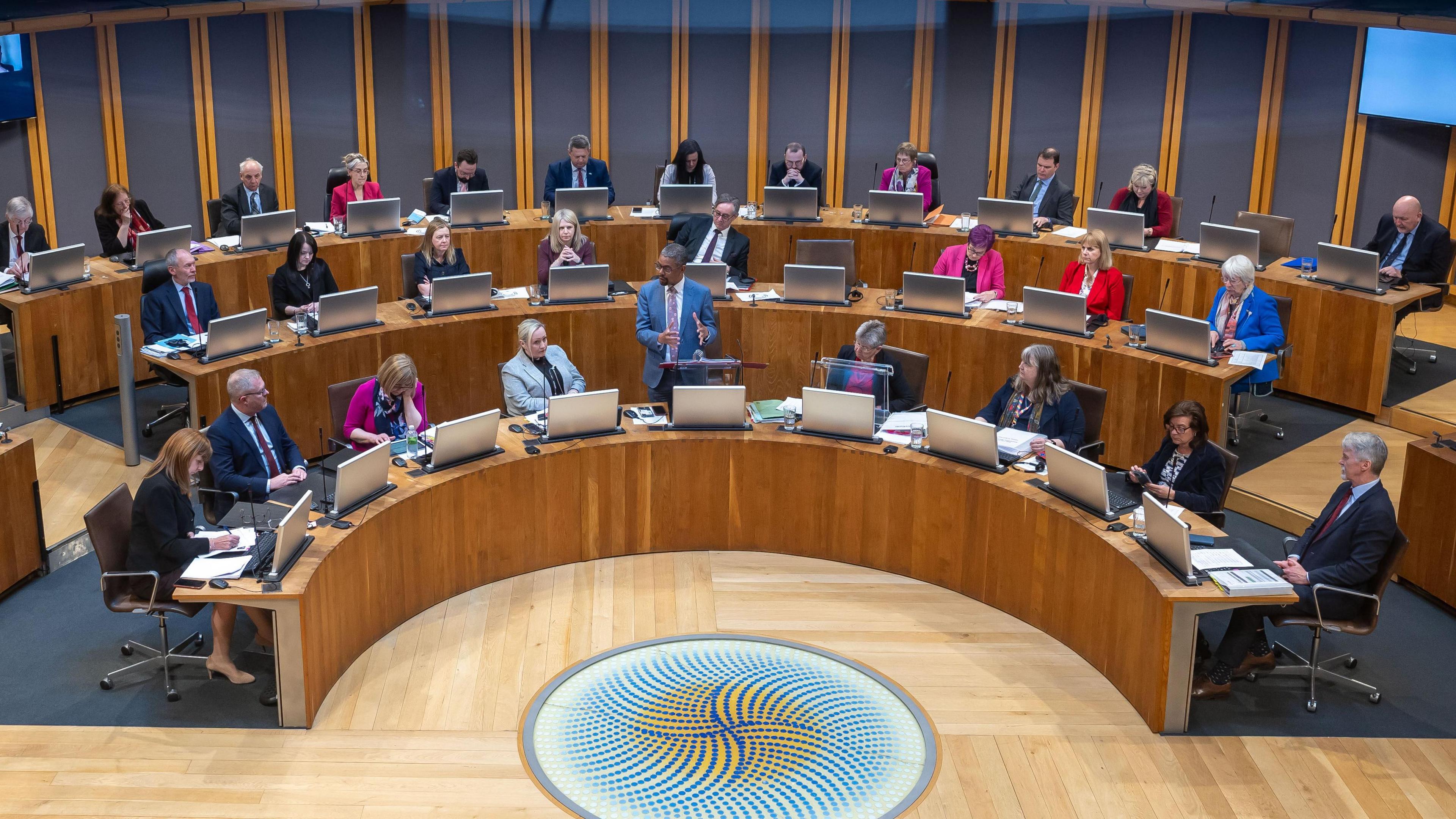Warning Senedd gender equality bid may be unlawful

At the next Senedd election parties may have to ensure at least 50% of their candidates are women
- Published
A proposed new law to enforce gender equality in elections to the Welsh Parliament may be unlawful, the UK's equality watchdog has said.
The Equality and Human Rights Commission (EHRC) warned that the law could breach the Equality Act if candidates can self-identify as women, even if that is not their legal sex.
Labour Welsh government ministers want political parties to draw up lists of candidates containing at least 50% women.
The Welsh government said political parties would risk legal challenge if they do not provide accurate information.
Gender-equal Senedd plans postponed at 11th hour
- Published30 November 2023
Fears of legal threat to more gender equal Senedd
- Published27 June 2023
Politician gender quotas 'not in Senedd's power'
- Published11 March 2024
Meanwhile a Welsh political expert warned a Senedd committee on Thursday that the issue of self-identification could put officials in charge of elections - returning officers - in an "invidious position".
The proposals are part of the plans - also backed by Plaid Cymru - to reform the Senedd with more politicians.
Separate planned legislation will expand the size of the Senedd from 60 to 96 politicians.
There are already concerns, held by Welsh Parliament Presiding Officer Elin Jones, that the gender equality proposals are not in the powers of the Senedd.
That would not stop the bill being passed, but it raises the prospect of the legislation being argued over in the courts.
Parties would need to draw up lists of candidates for election, listed in order of who will be elected first.
The EHRC's concerns were raised in a letter to the Welsh Parliament committee looking at the reform plans, saying the bill "may lead to the inclusion of quotas based on a person's self-identified gender as opposed to their legal sex".
Interim chief executive John Kirkpatrick said this might be inconsistent with the Equality Act 2010.
He told the Senedd reform committee the anti-discrimination law sex was a person's legal sex, as stated on their birth certificate or acquired through a gender recognition certificate.
Candidates would need to declare their gender in a statement. Mr Kirkpatrick said it was unclear how that would work in practice.
He said if this means self-identified gender, "this is unlikely to be lawful as not all those who self-identify as women will be considered to be legally be so under the [Equality] Act."
"If 'gender statements' refer to a statement of one's legal sex this should be made clear."
What does trans mean and what is the Cass review?
- Published16 May 2024
'Taken at face value'
The minister in charge of the law has previously told the Senedd reform committee that gender information from a candidate would be taken at face value.
Jane Hutt said in March, external that information on gender would be taken at face value.
She said returning officers, who are in charge of running elections in local areas, are not going to investigate the accuracy of any of the information provided.
However, candidates providing inaccurate information who win an election could face a challenge known as an election petition, according to a Welsh government official who spoke to the committee.
The Welsh government has previously supported the idea of people being allowed to self-identify whether they are men or women, although it does not have the powers to pass such legislation.
Labour has dropped such plans at UK level, while the Conservative UK government blocked Scottish legislation on self-ID.
Meanwhile the presiding officer has complained about the time given by the Welsh government to scrutinise the law.
The first stage in the Senedd has been given nine weeks, instead of the usual 12.
Referring to the different opinions on whether the law is in the powers of the Senedd, Ms Jones said in a letter in March: "It is regrettable that your committee will have less time than is typically the case to consider this novel and complex issue."
What did the Welsh government say?
In response the Welsh government did not directly address the EHRC's claim the bill may be unlawful.
But a spokesman said ministers do not use the word gender in the bill, or define a woman.
It said the rules on quotas had been designed to "accord" with the new electoral system for the expanded Senedd, "and existing rules with regard to nominations, which involve candidates providing accurate personal information in nomination papers and returning officers accepting that information at face value.
"Parties and candidates will have an interest in ensuring that accurate statements are made – otherwise they run the risk of challenge."
It said the timetable for stage 1 was agreed with the committee that agrees Senedd business.
On the matter of whether the law is in the competence of the Senedd to pass, the Welsh government spokesman added: "The Trefnydd and Chief Whip, as the Member in Charge of this Bill, made the statement that it would be within the Senedd’s legislative competence.
"The Llywydd reached a different view. Given that these reforms originated within the Senedd itself, we believe it is right to return this matter to Members for consideration."
'Potentially invidious'
The committee took evidence on the bill from political parties and others on Thursday.
Among speakers was Laura McAllister, the author of a report from 2017 on expanding the Senedd, which had backed gender quotas being put into law.
She warned that the issue of self-ID and terminology was putting constituency returning officers in a “potentially invidious position”.
“I think that’s the last thing we should do, because their role is as a guardian of the process of approving candidate lists in this case and I think we need to treat that with great respect and great care.”
She added: “The problem we have, of course, is that gender has become the language that we've used when we've talked about quotas in the past, and it's used extensively in our expert panel report, but the debate on gender and sex has moved on considerably in the past seven years.
“All I would say is we do need to be very, very careful that we give this bill every chance of being within competence [of the Senedd] by using the terminology that is fundamentally legally acceptable to organisations that police the Equality Act.”
Peter Stanton, chief executive of the Association of Electoral Administrators, said they agreed with the principle of the bill.
But he added: "We have raised concerns about potential challenges to a candidate's given gender. Any protocol to raise and consider objections to nomination papers would need to be clarified in secondary legislation."
On Thursday, the committee also heard from pro-gender equality groups, the Fawcett Society and Elect Her, as well as senior officials from political parties.
Jemima Olchawski of the Fawcett Society told the committee it takes the position that it is "for parties to determine what is their kind of position and we would support inclusive lists that would include, for instance, trans women”.
Hannah Stevens, chief executive of Elect Her, said: “We’re not interested in defining what a woman is – the patriarchy has been doing that for long enough.”
Welsh Conservative director Tom James said there were concerns on where lists were left if someone’s self-identification changed, and the capacity to find candidates.
“Are you saying if a party wasn’t able to find enough female candidates or candidates who identify as women for the sake of it, would you say that they are not therefore eligible to take party?” he said, indicating he thought smaller parties rather than his or the other large groups could face that issue.
Geraint Day, deputy chief executive of Plaid Cymru, said there will be “some challenges” but that with "goodwill" they could be overcome.
Welsh Labour’s general secretary, Joanna McIntyre, said her party supported the general principles of the bill.
“We’re keen to play our part within the confines of the law and ensure there’s more diversity at all levels of government,” she said.
The Welsh Conservatives said: “Voters should be allowed to choose candidates based on merit, not have them forced upon them by political parties with gender quotas."
Related topics
- Published18 September 2023

- Published30 January 2024
